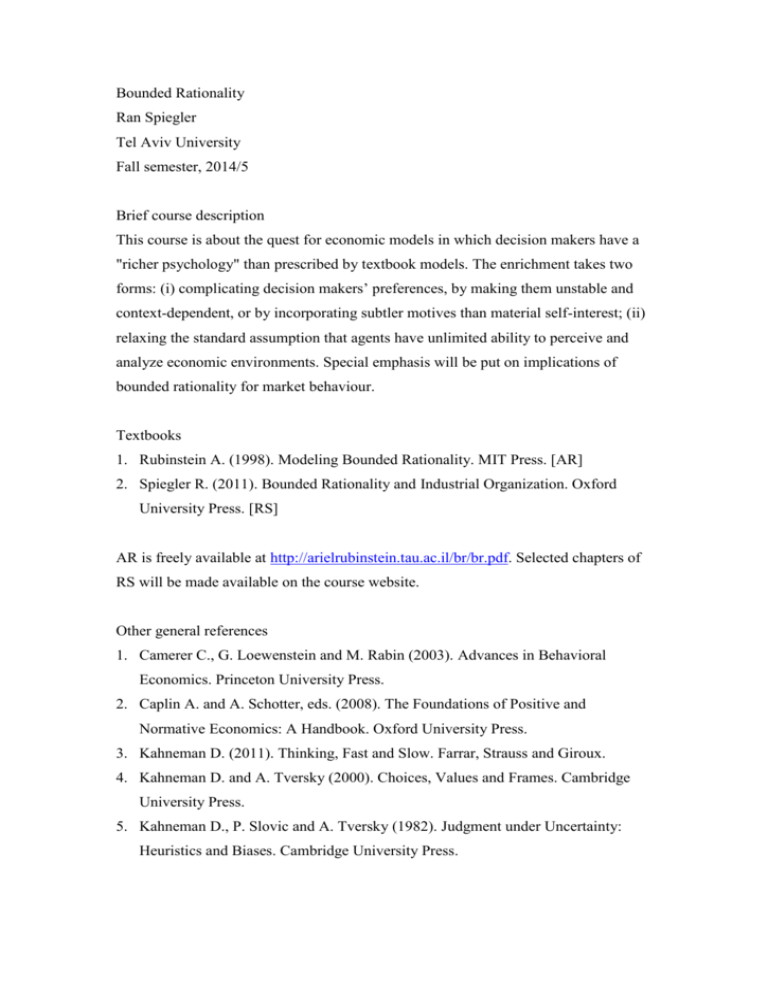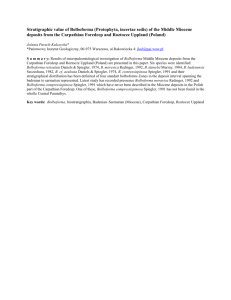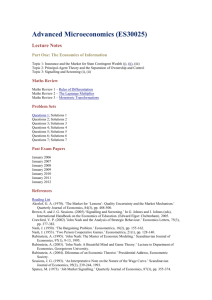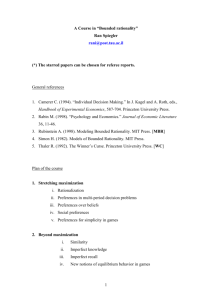A Course on "Topics in Psychology and Economics"
advertisement

Bounded Rationality Ran Spiegler Tel Aviv University Fall semester, 2014/5 Brief course description This course is about the quest for economic models in which decision makers have a "richer psychology" than prescribed by textbook models. The enrichment takes two forms: (i) complicating decision makers’ preferences, by making them unstable and context-dependent, or by incorporating subtler motives than material self-interest; (ii) relaxing the standard assumption that agents have unlimited ability to perceive and analyze economic environments. Special emphasis will be put on implications of bounded rationality for market behaviour. Textbooks 1. Rubinstein A. (1998). Modeling Bounded Rationality. MIT Press. [AR] 2. Spiegler R. (2011). Bounded Rationality and Industrial Organization. Oxford University Press. [RS] AR is freely available at http://arielrubinstein.tau.ac.il/br/br.pdf. Selected chapters of RS will be made available on the course website. Other general references 1. Camerer C., G. Loewenstein and M. Rabin (2003). Advances in Behavioral Economics. Princeton University Press. 2. Caplin A. and A. Schotter, eds. (2008). The Foundations of Positive and Normative Economics: A Handbook. Oxford University Press. 3. Kahneman D. (2011). Thinking, Fast and Slow. Farrar, Strauss and Giroux. 4. Kahneman D. and A. Tversky (2000). Choices, Values and Frames. Cambridge University Press. 5. Kahneman D., P. Slovic and A. Tversky (1982). Judgment under Uncertainty: Heuristics and Biases. Cambridge University Press. Plan of the course 1. Introduction: Bounded rationality in individual choice (week 1) AR, Ch. 1 Bernheim, D. and A. Rangel (2009): "Beyond Revealed Preference: ChoiceTheoretic Foundations for Behavioral Welfare Economics," Quarterly Journal of Economics 124, 51--104. Rubinstein, A. and Y. Salant (2012): “Eliciting Welfare Preferences from Behavioral Datasets,” Review of Economic Studies 79, 375-387. Salant, Y. and A. Rubinstein (2008): "(A,f): Choices with Frames," Review of Economic Studies.75, 1287-1296. 2. Market competition in high-dimensional objects (week 2) RS, Ch. 7 Bachi, B. and R. Spiegler (2014), "Buridanic Competition," mimeo. Gabaix, X. and D. Laibson (2006), "Shrouded Attributes, Consumer Myopia, and Information Suppression in Competitive Markets," Quarterly Journal of Economics 121, 505-540. Spiegler, R. (2006): "Competition over Agents with Boundedly Rational Expectations," Theoretical Economics 1, 207-231. 3. Framing in markets (weeks 3-4) RS, Ch. 10 Piccione, M. and R. Spiegler (2012): "Price Competition under Limited Comparability," Quarterly Journal of Economics 127, 97-135. Salant, Y. and A. Rubinstein (2008): "(A,f): Choices with Frames," Review of Economic Studies.75, 1287-1296. Spiegler, R. (2014): "On the Equilibrium Effects of Nudging", mimeo. Spiegler, R. (2014): "Competitive Framing", American Economic Journal: Microeconomics 6, 35-58. 4. Methodological digression: Rationalizing boundedly rational choices (weeks 5-6) AR, ch. 2 RS, ch. 6,13 Kalai, G., A. Rubinstein and R. Spiegler (2002): "Rationalizing Choice Functions by Multiple Rationales," Econometrica 70, 2481-2488. Rubinstein, A. and Y. Salant (2006): "A Model of Choice from Lists," Theoretical Economics 1, 3-17. 5. Models of non-rational expectations (weeks 7-9) AR, ch. 7 RS, ch. 8 Esponda, I. (2008), "Behavioral Equilibrium in Economies with Adverse Selection," American Economic Review 98, 1269-91. Jehiel, P. (2005): "Analogy-Based Expectation Equilibrium," Journal of Economic Theory 123, 81-104. Jehiel, P. and F. Koessler (2008): "Revisiting Games of Incomplete Information with Analogy-based Expectations," Games and Economic Behavior 62, 533-557. Osborne, M. and A. Rubinstein (1998), "Games with Procedurally Rational Players," American Economic Review 88, 834-847. Spiegler, R. (2014), "Bayesian Networks and Boundedly Rational Expectations", mimeo. 6. Contracting with dynamically inconsistent agents (weeks 10-11) RS, ch. 1-4 7. Reference-dependent behavior (weeks 12-13) RS, ch. 9 Eliaz, K. and R. Spiegler (2014), "X-Games", mimeo. Eliaz, K. and R. Spiegler (2012): “Reference-Dependence and Labor Market Fluctuations,” Working Paper. Koszegi, B. and P. Heidhues (2012), "Regular Prices and Sales", Theoretical Economics, forthcoming.








